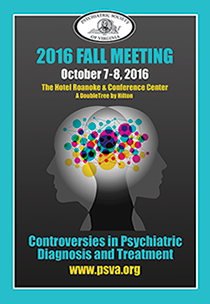Spring 2016 Issue |
District Branch Report
Psychiatric Society of Virginia District Branch Report to the Area V Council Meeting
American Psychiatric Association
March 12-13, 2016
John P. D. Shemo, MD
Rizwan Ali, MD
Adam Kaul, MD
PSV Representatives to the
APA Assembly
- Problems with insurance reimbursement rates remain a major issue in Virginia. As I have noted in the past, Anthem will reimburse other “cognitive” physicians at 120 to 130 percent of the Medicare rate, but will reimburse psychiatrists, for an hour of service, at about 58 percent of the Medicare rate. Some large groups and universities have been able to bargain somewhat better rates. It is my understanding that UVA has an agreement that all physicians are paid the same fee for the same code. I have been unable to confirm this, having been told that part of their agreement with Anthem is to not reveal their agreement with Anthem.
- I am aware of a psychiatrist who has joined a large multispecialty group where again all the physicians are paid the same rate for a given code. Anthem, however, has so far refused to extend this to the psychiatrist as that group is insisting. It remains to be seen how/if this gets resolved.
- The unfortunate reality is that this has led more and more psychiatrists to quit insurance panels, saving the insurance companies even more as patients are not able to find any “network providers” and the companies reimburse the patient even less than they reimburse the network provider for using a “non-network provider.”
- Virginia watches with keen interest the progress of the APA-backed lawsuit against Anthem for their refusal to comply with the mental health parity law.
- At the legislative level two bills were proposed to address step therapy, also known as fail-first policies. One would have prohibited health plans from requiring step therapy for psychiatric medications and the second would have required a strict protocol when step therapy is used for other medications. Both bills were “passed by” indefinitely in the House Commerce, and Labor Committee, but Senator Bill DeSleph plans to reintroduce this important issue in the next session.
- There was a bill introduced that would require the CSB (Community Service Board) to notify the personal representative and a family member of a person who is the subject of a commitment hearing regarding the time and location of such a hearing and require the judge to consider any testimony/evidence presented by the personal representative/family member. This bill has passed the House of Delegates and will be heard in the Senate Courts Committee.
- Another bill was also passed by the House of Delegates and will be heard in the Senate Courts Committee which maintains that if a CSB does not recommend a TDO (temporary detention order), they must notify the person who initiated the ECO and offer to help them communicate with the magistrate if the person disagrees with the CSB recommendation. The magistrate conducting a TDO hearing must consider information provided by the person who initiated the ECO. In Virginia, an ECO (emergency commitment order) is of eight hours duration, which is the least period of time for similar mechanisms of any state in the country. A TDO (temporary detention order) is for 72 hours unless part of that time falls on a weekend. During the time of the TDO, a formal commitment hearing is conducted.
- A bill to eliminate the COPN (certificate of public need) requirement for the opening of any health facility of any kind passed the House but is expected to not pass the Senate.
- The Psychiatric Society of Virginia Scientific Meeting was held in Richmond on February 27th. It was well attended. We continue to have significantly increased participation by psychiatric residents and even medical students, fostered in part by our annual student and resident poster session competition.





